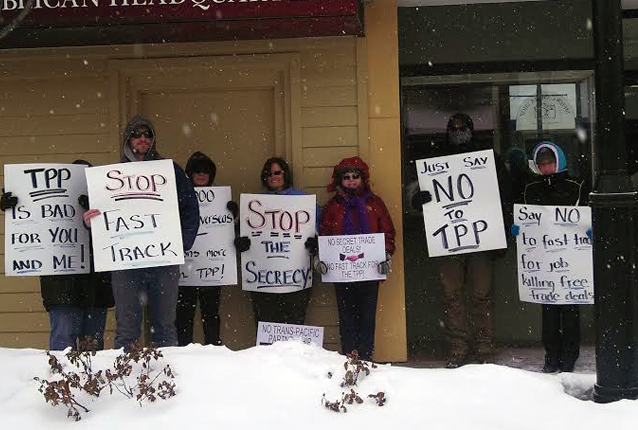Given that we’re used to a slow moving Congress, it’s understandable that “Fast Track” legislation sounds promising. Unfortunately, Congress will soon consider “Fast Track,” which would limit debate and prevent amendments in Congress on trade deals. Such expedited authority would make it much easier to pass future trade agreements, including the proposed anti-worker Trans-Pacific Partnership agreement.
Jobs With Justice opposes “Fast Track” because it is a license to continue trade policies written by the 1% for the 1% without an ability to hold our country’s negotiators accountable for provisions that hurt working families.
Trade agreements like the Trans-Pacific Partnership, drafted by special interests in the backrooms of power, should be subject to vigorous democratic debate. “Fast Track” limits Congress’ ability to oppose specific provisions within trade agreements that would never pass on their own. We know from the record of failed trade deals like NAFTA that these provisions have a devastating impact on workers and their communities.
Americans deserve a fair process that gives Congress the opportunity to influence trade deals and to send bad trade deals back to the negotiating table for improvement. If you agree, join with Jobs With Justice and groups across the country who are calling on Congress this week to say NO to fast track.
UPDATE – 2/6/14: Last week, hundreds of thousands of people across the country attended protests, rallies, and contacted their members of Congress to voice their opposition to any legislative attempts to fast track bad trade deals. In response, Senate Majority Leader Harry Reid (D-Nev.) publicly confirmed he had no interest in advancing “Fast Track” legislation in the Senate, despite the Obama administration’s urging.
Unfortunately, there’s still momentum to rush through dangerous free-trade agreements in the House of Representatives.
Call your representatives at 202-224-3121 right now and tell them to vote NO on S.1900/H.R. 3830, the Baucus-Hatch-Camp “Fast Track” legislation. (You can look up them up here!)
Learn more about why fast track is bad policy below or in this must-read editorial by former House Democratic Whip and Jobs With Justice board member David Bonior.








Linda Ainouche, Thanks for replying.
You have indeed opened a debate, with your film “Dreadlocks Story”,
a very serious debate, however as a film maker I believe you all thrive on critics.
As an anthropologist you seem to follow the usual pattern of western academia, which is to denude the African of all worthwhile attributes.
From what I’ve seen of the trailer you started with a foregone conclusion and
have continued to cement that view.
Had you really known anything about Rastafari then you would know that as far as the Jamaican
“founders” of the faith are concerned the inspiration is directly through the revelation of the personage of His Imperial Majesty Haile Selassie I,
Emperor of Ethiopia and that locks have been a part of that culture for countless millennia.
As for India, which was first peopled by Africans there are indeed many similarities,
but no one would dare to suggest,
even in these times of madness,
that Indian culture is older than that of Africa.
The first and second waves of Indians were Africans,
long before any rude “Aryan”, Turanian or Scythian was even out of the caves.
In fact the sacred river still bears the name of the Ethiopian general Ganga / Ganges.
Ind / Indi means Black this word provides the name of the two ancient founder sons hIND & sIND. One of the former names of India was Cusha Dwipa,
the Cush coming from an ancient name of Ethiopia which was Cush.
Like China with it’s Kunlan (African) Shan mountain range,
so is India with it’s Hindu Cush mountain range.
I suggest you read some books not on the usual western reading list and
gain some hidden knowledge.
Personally I cannot be in any film, good or bad,
but if I can contribute to you making a great film, I will.
Here are some leads, for starters.
African Presence in Early Asia – 1985 (+ A.P. in Early Europe & A.P. in E. America)
Wonderful Ethiopians of the Ancient Cushite Empire – Ms. Drusilla Dunjee Houston 1926 (re- 1985)
Ethiopia & the Origin of Civilization – John G. Jackson 1939